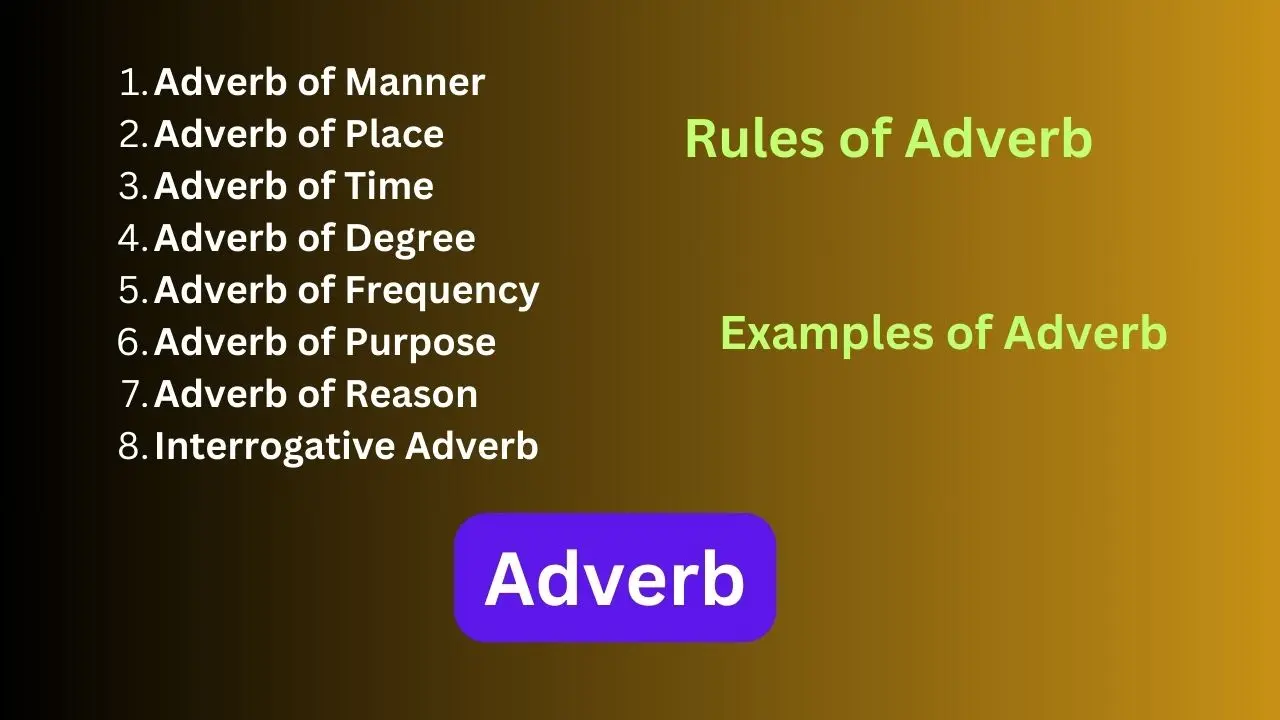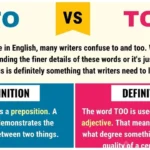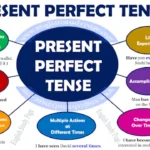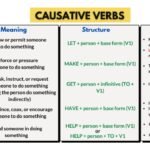इस पोस्ट में हम Adverb के बारे में विस्तार से चर्चा करने वाले है, यदि आप कोई प्रतियोगिता परीक्षा की तैयारी कर रहे है तो यह पोस्ट आपको बगुत ही ज्यादा मदद करने वाली है| इसलिए पोस्ट को अंत तक जरुर पढ़ें|
Adverb in Hindi
Definition: An Adverb is a word that qualifies an adjective a verb an another Adverb.
परिभाषा: क्रिया-विशेषण वह शब्द है जो एक विशेषण को एक क्रिया और दूसरे क्रिया-विशेषण की योग्यता प्रदान करता है।
Example: Ram is high smart. (✓) / He lough very loudly. (✓) / Unfortunately i miss the train. (✓)
According to uses Adverb is mainly divided into Eight forms:
उपयोगिता के आधार पर Adverb को मुख्यत: 8 भागो में बाटा गया है|
- Adverb of Manner
- Adverb of Place
- Adverb of Time
- Adverb of Degree
- Adverb of Frequency
- Adverb of Purpose
- Adverb of Reason
- Interrogative Adverb
1. Adverb of Manner
Definition: An adverb that shows the made and manner an action is called adverb of manner.
Example: He lough loudly. (✓) / He writes clearly. (✓)
Fact (i): It become answer of the question ‘How’
Facts (ii): Generally an adverb of manner gets structure Adjective + ly
Example: Slow + ly = Slowly, Clear + ly = Clearly, Loud + ly = Loudly etc.
Note: ध्यान रहे कि कोई Adverb of Manner (Adjective+ly) को Replace करने हेतु With + Adjective का भी प्रयोग किया जा सकता हैं|
Example: He is speaking with honestly. (x) / He is speaking with honesty. (✓) / He is speaking honestly. (✓)
Facts (iii): Fast, First, Hard, Last बिना ‘ly’ के Adjective तथा Adverb दोनों की भूमिका निभाते है| अत: इसका Manner बनाने हेते इसमें ‘ly’ की आवश्यकता नहीं होती है|
Example: This is first Train. (✓) / This Train runs firstly. (✓) / This train runs fast. (✓)
Facts (iv): Daily / Weekly / Monthly / Yearly etc ‘ly’ के साथ भी Adjective तथा Adverb दोनों की भूमिका निभाता है| अत: इसका Manner बनाने हेते इसमें ‘ly’ की आवश्यकता नहीं होती है|
Example: This is a daily Train. (✓) / This Train Arrived Daily. (✓)
Facts (v) Good = Adjective / Well = Adverb
Example: Ram is a well student. (x) / Ram is a good student. (✓) / Ram is a good qualified parson. (x) /Ram is well qualified parson. (✓)
Facts (vi) Bad (Adjective) = Ill (Adverb)
Example: Ram is an ill student. (x) / Ram is a bad student. (✓) / He is a bad mannered boy. (x) / He is an ill mannered boy. (✓)
2. Adverb of Place
An Adverb that show the place for an action is called adverb of place.
Example: Here, There, Inside, Outside, In the room, On the stage etc.
Example: I will go there tomorrow.
Fact: It become answer of the question ‘Where’
3. Adverb of Time
An adverb of shows the time for an action is called adverb of time.
Example: Today, Tomorrow, Next day, Yesterday, In the morning, In the evening etc.
Ex: He will tomorrow.
Fact: It become answer of the question ‘When’
4. Adverb of Degree
An adverb of shows the degree the quantity of an action is called adverb of degree.
Example: Much, Too much, So much, little etc.
Ex: He speaks too much.
Fact: It become answer of the question ‘ How much’
5. Adverb of Frequency
An adverb of shows the frequency of an action is called adverb of frequency.
Example: Ones, Twice, Threes, Four times, Five times etc.
Ex: He came threes on the stage.
Fact (i): It become answer of the question ‘ How often’
Fact (ii): ध्यान रहे कि Always, Never, Seldom, Rearly, Sometimes, Generally etc. को भी Adverb of Frequency के दायरे में रखा जाता है|
6. Adverb of Purpose
An adverb that shows the target or purpose of an action is called purpose of adverb.
Example: To play, To seen, To dance etc.
Ex: He is going to play Cricket.
Fact: It become answer of the question ‘ For what’
7. Adverb of Reason
An adverb that sows the cause or reason of an action is called adverb of reason.
Example: For + Gerund, due to, owing to, ……because of, … etc.
Example: He was chided for coming let.
Fact: It become answer of the question ‘ Why’
8. Interrogative of Adverb
An adverb that question for an Adjective and Adverb is called Interrogative Adverb.
Example: How, Where, When etc.
Ex: Where does he play Cricket.
Some Uses of Adverb
1. Still / Yet
Still: It comes affirmative sense and structure.
Example: He is yet dancing on the stage. (x) / He is still dancing on the stage. (✓)
Yet: An adverb it comes in negative sense or structure.
Example: He has not still finish the task. (x) / He has not yet finish the task. (✓)
Note: ध्यान रहे कि जब Be form + Infinitive योजना को दर्शावे तो अधूरी योजना को दर्शाने हेतु ‘Yet’ का प्रयोग Affirmative Structure में भी होता है|
Example: He is yet to buy a new car.
2. Ago / Before
Ago: वर्तमान से लेकर किसी भूतकाल में घटी घटना के सम्पूर्ण अवध को दरशाने हेतु ‘Ago’ आता है|
Example: I visited Delhi six month ago.
Before: किसी दो घटनाओं में से यदि कोई घटना पहले घटित हो तो उसका कंडीशन दर्शाने हेतु ‘Before’ आता है|
Example: The train has started before i reached the station.
Note: ध्यान रहे कि यदि किसी Indirect Narration का main cause Past tense में रहे तो उसके Subject Ordinate part में Ago के जगह Before का प्रयोग होता है|
Example: Ram said that he had visited Delhi six month ago. (x) / Ram said that he had visited Delhi six month before. (✓)
3. Soon / Shortly / Presently / Directly
Soon: It can use of any kinds of tenses.
Example: He is coming soon. / He came soon. / He will come soon.
Shortly / Presently / Directly: These are used to make a sense of futurity.
Example: He is coming shortly. (✓) / He came shortly (x) / He will come shortly. (✓)
Note: ध्यान रहे कि इसका प्रयोग Past Structure में नहीं होता है|
4. Hard / Hardly
Hard: An adverb it comes to show an action done with full energy.
Example: He works hard. / He tried hard to solve the question.
Hardly: An adverb it comes to show lack of efficiency for an action.
Example: He could hardly solve the first question in the exam.
5. Ever / Never
Ever: (i) किसी Interrogative structure में इसका प्रयोग प्रश्न करने हेतु ‘कभी’ के अर्थ में किया जाता है|
Example: Had you ever seen the Taj?
(ii) किसी Affirmative structure में इसका प्रयोग ‘सदा/हमेशा’ के अर्थ में भी किया जाता है|
Example: He ever comes late.
Note: (i) ध्यान रहे कि इसी अर्थ ने इसी के स्थान पर Always का प्रयोग होता है, परंतु दोनों की उपस्थिति में बेहतर प्रयोग Ever का माना जाता है|
Note: (ii) Ever + Present Participle
Example: He is an ever crying boy.
Never: Ever का Negative जबाब प्रस्तुत करने हेतु Never का प्रयोग होता है|
Example: I have never seen the Taj.
6. Even / Only
Even (यहाँ तक की) : To show an action that runs against to the generally perception.
Example: Even a beggar hold mobile in my area.
Only (मात्र/केवल): प्राय: इसका प्रयोग उस शब्द के तुरंत पहले होता है, जिसके लिए यह प्रयुक्त हो|
Example: His brother had only died six month ago. (x) / His brother had died only six month ago. (✓)
Note: ध्यान रहे कि किसी रकम को दर्शाने हेतु Only का प्रयोग उस रकम के पहले अथवा बाद में कहीं भी हो सकता है|
Example: He has given me only ten rupees. (✓) / He has given me ten rupees only. (✓)
7. Very /Much
Very: (i) It comes before a positive form to stress its quality.
Example: Ram is very smart.
(ii) It comes before a Present Participle to stress its quality.
Example: This is a very interesting topic.
(iii) Very + Very can be used.
Example: This is a very vary important question.
(iv) Vey + Much can be used.
Example: I like it very much.
(v) Too/So + very can not be used.
(vi) The vey best
Example: Your performance was the very best.
Much: (i) It comes before a comparative form to stress its quality.
Example: Ram is much smarter then Shayam.
(ii) It comes before a past participle to stress its quality.
Example: It was a much interested topic.
(iii) Much + Much can not be used.
(iv) Much + very can not be used.
(v) Too/So + much can be used.
Example: He speaks too much.
Note: (a) Too much + Noun
Example: He has too much money.
Note: (b) Much too + Adjective
Example: He is much too lazy.
(vi) Much the best
Example: Your performance was much the best.
8. Fairly / Rearly
Fairly: It comes before of positive sense adjective to stress its quality.
Example: This topic is fairly interesting.
Rearly: It comes before a negative sense adjective to stress its quality.
Example: He was rearly Disappointed.
9. Late / Lately
Late (देर से): It can be used with any kinds of tenses.
Example: He comes late. (✓) / He came late. (✓) / He will come late. (✓)
Lately (जल्दी/शिघ): It comes to make the sense of futurity.
Example: He is coming lately. (✓) / He came lately. (x) / He will come lately (✓).
Note: ध्यान रहे कि इसका प्रयोग Past Structure में नहीं होता है|
10. Altogether / All together
Altogether (पूर्णत:): It comes in the sense of completely.
Example: He has altogether done the project.
All together (सब साथ-साथ / सभी एक साथ)
Example: We want there and enjoyed the party all together.
11. Already / All ready
Already (पूर्व में ही/पहले ही): It comes in the sense of earlier.
Example: He has already complete the task.
All ready (सब कुछ सही/सब व्यवस्थित ढंग से)
Example: We went there and found all ready.
12. Everyday / Every day
Everyday (Simple Adjective): It is an adjective that comes in the sense of simple.
Example: This is an everyday problem for me.
Every day (Delay Adverb): It is an adverb that comes in the sense of delay.
Example: He comes here every day.
13. Sometime / Some time / Sometimes
Sometime (भूतपूर्व): It is an adjective that comes in the sense of formal.
Example: Our sometime present was a scientist.
Some time (कुछ क्षण): It is an Adverb.
Example: I will go there on the stage for some time.
Sometimes (कभी-कभी): It is an also Adverb.
Example: Sometimes i forget your name.
Conclusion:
इस पोस्ट में हमने Adverb के बारे में बहुत ही अच्छे से बताने की कोशिश की है, उम्मीद है इसमें दी गई जानकारिय आप सभी को पसंद आई होंगी| यदि आपके मन में कोई भी सवाल हो तो हमें कमेंट में पूछ सकते है|
Read Also:






